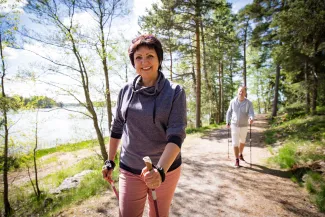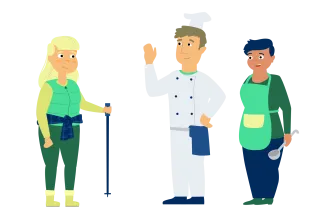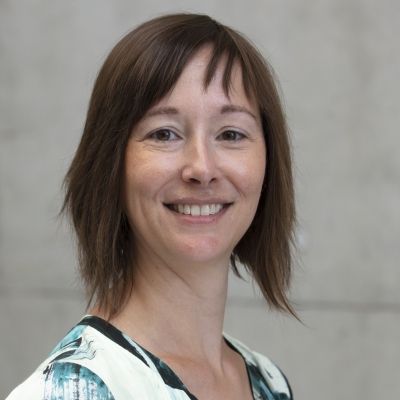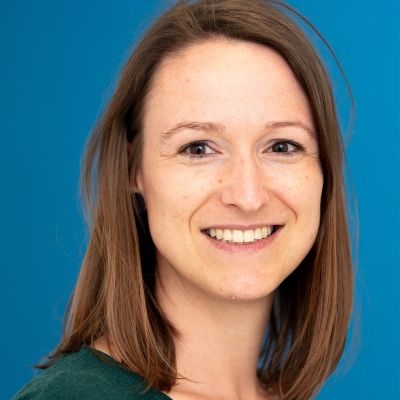Privacy by design: VITO returns management and control of health data to the citizen
With the We Are ecosystem, VITO is helping to develop a radically new and different way of dealing with personal (health) data of citizens. This is done by means of an innovative technological component but also by the development of new applications, such as the online prevention platform BIBOPP. It is intended to give citizens confidence in how their privacy-sensitive data are used - and above all: by whom and why - and thus to ‘empower’ them in terms of their data and personal health.

The data revolution that has unfolded over the past two decades is unprecedented. Our daily lives are increasingly taking place in a digital, online context. In recent years in particular, there has been growing concern about what happens to our personal data and who has access to it. This certainly also applies to data about our health that are generated, among other things, by the multitude of health apps on our smartphone (such as the pedometer) and activity trackers (such as a smartwatch). The handling of these data is very sensitive: when it comes to health data, we do not easily allow compromises.
We Are: data management by and for the citizen
VITO is working hard on a radically different, new approach to the management of privacy-sensitive (health) data. Central to this is the trust citizens have in this approach, and thus in the way their data - from pedometers to the risk of chronic diseases - is used. This is only possible if the data are protected with the best strategies and technologies and if citizens have total control over their personal data. Based on this philosophy, a new and ambitious ‘ecosystem’ was recently launched for the science-backed, sustainable use of personal health data. This We Are system is being built from the combined expertise of a collaboration between the Domus Medica GP association, Zorgnet Icuro, the King Baudouin Foundation, the Flemish Patients Platform and, finally, VITO. The We Are initiative also aims to make data, technological building blocks and knowledge in the field of preventive and curative healthcare more scientifically, economically and socially accessible, and to do so in a safe, ethical and transparent way.
In the first two years of the We Are project, the technological backbone of the ecosystem is being built. VITO is closely involved in this. ‘This is done on the basis of the Solid technology, which gives users of an online application access to an individual safe in which their data (both medical and non-medical data) from various applications are stored,’ says Elfi Goesaert of VITO. ‘The user remains the owner of their data at all times and they decide who can gain access to the safe, and to which data.’ The core principle of Solid is to keep data and applications (apps) separate. And therein lies the radically innovative element of this approach, because that principle is diametrically opposed to the current situation in which companies active on the web can easily - and sometimes without us knowing - collect our personal data, and in which it is often unclear for what purposes this is done or with whom the data are shared.
The basic idea of Solid sprung from the mind of Tim Berners-Lee, the inventor of the World Wide Web. But this innovative data technology is also being further researched and developed in Flanders, for example in the Flemish Artificial Intelligence Research Programme, of which We Are is a first application. This technology development is taking place in close cooperation with imec.
Expectations of the We Are system are high. Goesaert: ‘It will really and noticeably change the way we manage our personal data - starting with our health data.’
We Are should not only lead to responsible (health) data management. Within the ecosystem, new applications can also emerge that are of real use to citizens - and that make use of the data in the personal safes. That is why a number of use cases will be developed in the coming years within the context of various initiatives, of which the SAVE DATA project is one. In this project, health data can be used, for example, in the development of new health applications, in order to improve care and care policy (among other things, by making it more personal).
SAVE DATA is an example of a COOCK project, in which the Flemish government, via VLAIO, wants to stimulate the application of recently developed knowledge and prototypes. In concrete terms, use cases will be developed in order to disseminate knowledge from the We Are ecosystem to a broad group of stakeholders and innovators

BIBOPP: an evidence-based online prevention platform
A first example of a personal health application is BIBOPP, a platform with digital tools intended for citizens to improve their health in a preventive manner. The online platform, whose name stands for Burgers in Beweging met een Online PreventiePlatform (Citizens in Motion with an Online Prevention Platform), is the result of a physical questionnaire drawn up by general practitioners to offer advice to their patients. By digitising this questionnaire, people can now use it themselves.
‘The intention of BIBOPP is to give people more control over their health,’ says Nathalie Lambrechts of VITO. ‘By reusing the data from the questionnaire, users can draw up a personal action plan in BIBOPP to improve their general health. And the local dimension is very important here: this plan will refer to locally-organised activities and care providers, such as group sports sessions, cooking classes for healthier eating, but also specialised assistance, such as exercise coaches, dieticians and stop smoking coaches.’
Within BIBOPP, users can even share their results with their GPs. In the first phase, the platform was rolled out as a pilot project in the Kempen region of Mol and Turnhout. ‘But soon we want to roll it out elsewhere, and ultimately across the whole of Flanders,’ says Lambrechts.
During the corona pandemic, citizens were already able to use the BIBOPP platform to estimate their risk of being infected by the corona virus and of developing a serious illness. This was done on the basis of personal data such as information about lifestyle, chronic conditions, age and weight, but also vaccination status and behaviour.
‘The re-use of personal data in services that provide tailormade advice contributes strongly to the empowerment of users,’ says Lambrechts. ‘And so we apply the ideas of We Are in a very specific way, creating an ecosystem for prevention through smart health applications in this case. In this system, people can easily find qualitative (evidencebased) tools. And that is a big difference to today’s fragmented landscape, where the scientific foundation and also the intentions behind health apps and services are sometimes not clear.’
BIBOPP is the result of a collaboration between VITO, Zorgproeftuin LiCalab (Thomas More) and Domus Medica. The initiative was realised with the support of VLAIO, the Province of Antwerp and EmpowerCare (Interreg 2 Seas).




